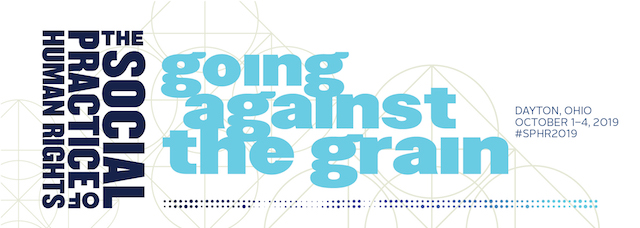Paper/Proposal Title
Rehumanization among Veterans of the Yugoslav Wars: Rethinking Reconciliation and Post-Conflict Justice
Location
Rethinking Transitional Justice
Start Date
10-3-2019 11:00 AM
End Date
10-3-2019 12:30 PM
Keywords
human rights, peace, post-conflict justice, reconciliation, rehumanization, social movements, Yugoslav Wars, veterans
Abstract
Rehumanization is a central element in powerful social movements after war. Drawing from ethnographic fieldwork in the Balkans, I consider the convergence and divergence between notions of rehumanization found in human rights literature and the role of rehumanization among veterans in Bosnia-Herzegovina and Serbia. Rehumanization plays a prominent role among these veterans because of the International Criminal Tribunal for the former Yugoslavia (ICTY), which has had varied social effects on Balkan communities. By supporting the ICTY, veteran associations have vetted themselves of potential war criminals, and thereby developed overlapping justice discourses that converge on the notion of reconciliation. There are clear divergencies, however, between their notions of rehumanization and the ideas of human rights theorists. The latter tend to emphasize rehumanization as a prerequisite or necessary condition for creating security among former enemies, which then allows for reconciliation. I argue that, when it comes to the Balkans, human rights theorists may have the backwards. Among veterans of the Yugoslav Wars, it was the ICTY, including its multiple justice mechanisms, that provided veterans with a sense of security and the possibility of even entertaining reconciliation; mainly as a way to make their associations stronger. Only after taking steps towards reconciliation do veterans apparently rehumanize their former enemies. Having observed these interactions, I argue further that veterans call their efforts ‘reconciliation’, but they are not truly reconciling, since they did not have relationships prior to the wars to reconcile. Instead, they are forgiving new relationships, with an overarching identity as veterans and superordinate institutions (viz. the ICTY and World Veterans Organization) that provide the necessary groundwork for working together towards peace. The article concludes by stressing the importance of international justice mechanisms and the plurality of reconciliatory efforts in fostering bottom-up approaches to rehumanization and support for human rights in post-conflict environments.
Author/Speaker Biographical Statement(s)
I am a political and legal anthropologist with specialization in human rights, religion, and cognitive science. I earned my Ph.D. in anthropology from the University of Connecticut, where I also earned graduate certificates in human rights and cognitive science. Before attending UConn, I earned an M.A. in philosophy from Colorado State University, and undergraduate degrees at Colorado University. Most of my research centers on cooperation and conflict, and I’ve explored these themes by conducting experimental research and extended post-conflict fieldwork in the Balkans. I am also actively involved in human rights advocacy. Besides participating in post-conflict reconciliation among veterans of the Yugoslav Wars, I undertake applied research in domestic violence intervention and serve as the U.S. Ambassador for the Human Rights Measurement Initiative. I am currently a postdoctoral fellow in the Department of Anthropology at the University of California, Los Angeles (UCLA), where I am working with Professor H. Clark Barrett on the Geography of Philosophy Project. To learn more about me, please visit my website: www.jordankiper.com
Included in
Human Rights Law Commons, Military, War, and Peace Commons, Social and Cultural Anthropology Commons
Rehumanization among Veterans of the Yugoslav Wars: Rethinking Reconciliation and Post-Conflict Justice
Rethinking Transitional Justice
Rehumanization is a central element in powerful social movements after war. Drawing from ethnographic fieldwork in the Balkans, I consider the convergence and divergence between notions of rehumanization found in human rights literature and the role of rehumanization among veterans in Bosnia-Herzegovina and Serbia. Rehumanization plays a prominent role among these veterans because of the International Criminal Tribunal for the former Yugoslavia (ICTY), which has had varied social effects on Balkan communities. By supporting the ICTY, veteran associations have vetted themselves of potential war criminals, and thereby developed overlapping justice discourses that converge on the notion of reconciliation. There are clear divergencies, however, between their notions of rehumanization and the ideas of human rights theorists. The latter tend to emphasize rehumanization as a prerequisite or necessary condition for creating security among former enemies, which then allows for reconciliation. I argue that, when it comes to the Balkans, human rights theorists may have the backwards. Among veterans of the Yugoslav Wars, it was the ICTY, including its multiple justice mechanisms, that provided veterans with a sense of security and the possibility of even entertaining reconciliation; mainly as a way to make their associations stronger. Only after taking steps towards reconciliation do veterans apparently rehumanize their former enemies. Having observed these interactions, I argue further that veterans call their efforts ‘reconciliation’, but they are not truly reconciling, since they did not have relationships prior to the wars to reconcile. Instead, they are forgiving new relationships, with an overarching identity as veterans and superordinate institutions (viz. the ICTY and World Veterans Organization) that provide the necessary groundwork for working together towards peace. The article concludes by stressing the importance of international justice mechanisms and the plurality of reconciliatory efforts in fostering bottom-up approaches to rehumanization and support for human rights in post-conflict environments.



